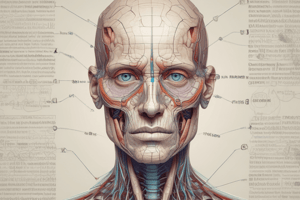Podcast
Questions and Answers
Which suffix means 'surgical removal'?
Which suffix means 'surgical removal'?
- plasty
- ectomy (correct)
- stasis
- emia
Which word root is related to the gall, or bile?
Which word root is related to the gall, or bile?
- hepato
- gastro
- chole (correct)
- hemo
What does the prefix 'tachy-' mean?
What does the prefix 'tachy-' mean?
- deficient
- fast (correct)
- slow
- excessive
Which of the following word roots signifies 'red'?
Which of the following word roots signifies 'red'?
What does the suffix '-phobia' refer to?
What does the suffix '-phobia' refer to?
Which prefix means 'without'?
Which prefix means 'without'?
What does the word root 'cysto' refer to?
What does the word root 'cysto' refer to?
Identify the correct root word for 'vein'.
Identify the correct root word for 'vein'.
What does the suffix '-malacia' mean?
What does the suffix '-malacia' mean?
Which prefix means 'inside'?
Which prefix means 'inside'?
Which word root is related to 'intestine'?
Which word root is related to 'intestine'?
Which word root means 'bone'?
Which word root means 'bone'?
What does the term 'axillary' refer to?
What does the term 'axillary' refer to?
Which term is used to describe a tooth or bridge pattern used in prosthodontic dentistry?
Which term is used to describe a tooth or bridge pattern used in prosthodontic dentistry?
What term best describes the use of hand or finger pressure to locate or examine?
What term best describes the use of hand or finger pressure to locate or examine?
What does the term 'fascial' refer to?
What does the term 'fascial' refer to?
Which term describes the condition of a racing or increased heartbeat?
Which term describes the condition of a racing or increased heartbeat?
Which term is used to describe a location within the abdomen?
Which term is used to describe a location within the abdomen?
Which of the following describes the term 'language'?
Which of the following describes the term 'language'?
What does the suffix '-itis' denote in medical terminology?
What does the suffix '-itis' denote in medical terminology?
What is the primary focus of dentistry?
What is the primary focus of dentistry?
What is a smaller version of an artery called?
What is a smaller version of an artery called?
Which of the following terms indicates the reduction of size?
Which of the following terms indicates the reduction of size?
What percentage of medical terms are based on Greek or Latin words?
What percentage of medical terms are based on Greek or Latin words?
What is the significance of prefixes in medical terminology?
What is the significance of prefixes in medical terminology?
Which example illustrates a suffix used to form an adjective?
Which example illustrates a suffix used to form an adjective?
From which Latin word is 'medicine' derived?
From which Latin word is 'medicine' derived?
Which suffix results from combining a word root and a suffix into one accepted form?
Which suffix results from combining a word root and a suffix into one accepted form?
Who is known as the 'father of medicine'?
Who is known as the 'father of medicine'?
What does the prefix DYS- indicate when added to the term -PNEA?
What does the prefix DYS- indicate when added to the term -PNEA?
What does the term 'abdominal pain' lack in its description?
What does the term 'abdominal pain' lack in its description?
Flashcards are hidden until you start studying
Study Notes
Language and Terminology
- Language is the ability to acquire and use complex systems of communication, particularly in humans.
- A language is a specific example of such a system.
- Terminology refers to special words or expressions used in relation to a particular subject or activity.
Medicine and Dentistry
- Medicine is the science and practice of the diagnosis, treatment, and prevention of disease.
- The word "medicine" is derived from Latin "medicus," meaning "a physician."
- Dentistry is a branch of medicine that deals with the study, diagnosis, prevention, and treatment of diseases, disorders, and conditions of the oral cavity.
Medical Terms
- A term is a word or phrase used to describe a thing or to express a concept, especially in a particular kind of language or branch of study.
- Most medical terms are based on Greek or Latin words.
- Understanding the roots of words in the field of Health, Medicine, and Dentistry helps in understanding medical terms.
Hippocrates
- Hippocrates was a Greek physician known as the "father of medicine."
- 75% of medical terms are based on Greek or Latin words.
Prefixes
- Prefixes are word beginnings that modify or qualify the meaning of word roots.
- Examples of prefixes include:
- intra- (meaning "within")
- dys- (meaning "difficult" or "painful")
Suffixes
- Suffixes are word endings that form nouns, adjectives, or verbs.
- Suffixes can have specialized meanings, such as:
- -itis (meaning "inflammation")
- -ectomy (meaning "surgical removal")
- -oma (meaning "tumor")
- Suffixes can combine with word roots to form adjectives, verbs, or nouns.
Word Roots
- Word roots are the core of a word that conveys the main meaning.
- Examples of word roots include:
- aden- (meaning "gland")
- angio- (meaning "blood vessel")
- arthro- (meaning "joint")
- cardio- (meaning "heart")
Homonyms
- Homonyms are words that are similar in sound and spelling but have different meanings.
- Examples of homonyms used in dentistry include:
- die (tooth or bridge pattern) vs. dye (coloring material)
- auxiliary (helping) vs. axillary (underarm site)
- esthetics (pertaining to beauty) vs. aesthesia (loss of pain sensation)
Studying That Suits You
Use AI to generate personalized quizzes and flashcards to suit your learning preferences.




